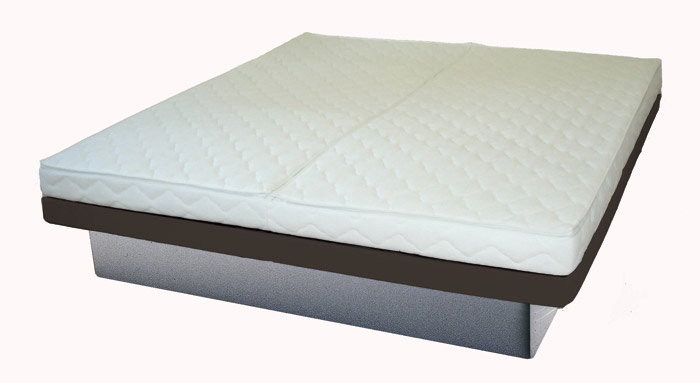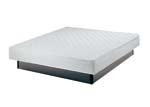
Informations regarding the different waterbed systems of manufacturer and
producer.
Waterbeds primarily consist of two types, hard-sided beds and soft-sided beds. The Softside Waterbeds can be separated again in different groups regarding the size, material and sense of used foam rails.
The
easiest construction of a waterbed is the hardside waterbed. A
hardside waterbed consists of a water-containing mattress inside a
rectangular
frame of wood resting on a plywood deck that sits on a platform.
Platforms may incorporate drawer systems for storage and have the use
of replace the weight of watermattress on as much places as possible.
A Softside waterbed consists of a water-containing mattress (waterbag) inside of a rectangular frame of a soft foam rail set, zippered inside of a fabric casing, which sits on a platform. The effect is to look like a conventional bed and is designed to fit into existing bedroom furniture. The platform usually looks like a conventional foundation or box spring, and sits atop a much-stronger-than-normal metal frame or wooden frame.
Early waterbed
mattresses in the early seventies and many inexpensive modern mattresses
have a watermattress without fibers inside. These mattresses are commonly
described in the industry as "free flow" mattresses and have
a swinging time of 15-20 seconds. When the water mass was disturbed,
significant wave-action could be felt.
They
needed some time to stabilize after a disturbance. Later types employed
wave-reducing methods, including fiber batting and interconnected water
chambers.
We normally use fibers to regulate the quantity of waves of the waterbed.
Fiber can be added into the watermattress in different qualities. If
we use a very strong fiber the mattress with 5-6 fibers, fixed on the
bottom of the watermattress, will be waveless around 10-20 years.
Double waterbeds with two waterchambers and flexible chamberisolation
inside are called dual waterbeds. If you sleep with two persons on the
waterbed you should use a dual waterbed. If the weight between the two
persons is higher than 20 kg the comofrt of a single watermattress with
one watermattress and one waterbed heater is much lower than that of
a duals waterbed. In a dual waterbed the waves will only stay in the
chamber of the mattress with the moving person on it. On a solo waterbed
both sides would be swinging if one of the users moves.
Water beds are normally heated by a waterbed-heater. Temperature is controlled
via a thermostat and set to personal preference, but is most commonly
average skin temperature, 28 - 30 °C (around 86 °F). A typical
US- heating pad consumes 150–450 watts of power. The european standard
for softside waterbed heaters with a height of 20 cm to 23 cm is 200
- 300 Watt. Depending on insulation,temperature, bedding, use and other
things, electricity usage may vary significantly.
Waterbeds are usually constructed from vinyl (flexible PVC) or similar
material. The quality of the vinyl depends on the knowledge of the foil
-manufacturer. Modern waterbed foils are very longlife and durable.
Normally you use a mattress cover on the waterbed. The covers for waterbeds
must be more flexible than normal bed covers and they must be able to
absolve much sweet. They should be washable by minimum 60° and with
zippers around to fix it easiely on the watermattress. In Germany are
sold waterbeds mostly with a cover including a middle zipper. In other
countries like the netherlands or US-market most consumers use waterbeds
without middle zipper.
Advantages and disadvantages of a waterbed or watermattress
Waterbeds have several advantages and only some disadvantages over traditional
beds:
You can regulate the waterbed temperature, which makes it very comfortable
in the winter and in the summer. In the summer you can cool the waterbed
down and in winter you always have a warm bed, even if the room is cold.
Falling asleep is easier with the lowered blood pressure that comes from
resting in a warmer environment. The warmth of the water also helps muscles
to relax resulting in improved blood circulation while alleviating soreness
of stiff muscles and joints.
A waterbed has a Excellent sleeping comfort but many people first must
try sleeping on it for some nights untill they love it. The waterbed
shapes exactly to the human body, thus minimizing pressure, especially
around the joints. Waterbeds remove pressure from the spine allowing
the spinal muscles to fully relax, aiding in the treatment of backache.
In paralytic or movement-impaired people they can reduce the risk of
bedsores, because you can sleep in every direction well, not only on
the back.
If you wash the cover 2-3 times a year it is impossible for dirt and
dead skin particles to rest in the waterbed or to penetrate the water
mattress, which can then be wiped periodically with a cloth and special
vinyl cleaner. Thus virtually eliminating house dust mites in the waterbed.
Dust mites can trigger asthma, eczema, and allergies in people sensitive
to them.
A waterbed mattress has an average lifespan of over 4-20 years, depending
of the quality of vinyl and weldings. The comfort of the wtaerbeds never
goes lost within this time of use.
Waterbeds are used in the care of premature babies and are of great help
to pregnant and nursing mothers.
Disadvantages of waterbeds:
Constant heating is costly, especially in cold environments. A double
waterbed bed uses with a good waterbed-heeater about 300–500 kWh
a year. This is more or less the same as a standard refrigerator or freezer
in energy class A.
Bed sheets for waterbeds are expansive, because they have around 3-5%
very elastic fibre inside like Lycra or Elasthan.
Moving a waterbed is a more difficult process than a normal bed; the
water must be drained and the frame disassembled, then reassembled, the
mattress refilled with water, and heated for a period to get the water
back to the correct temperature.
Occasionally, water mattresses may leak. Plastic liners can prevent this,
but emptying, patching, refilling, and reheating it (and sleeping elsewhere
until all this is completed) is certainly an inconvenience. So choose
a high watermattress quality if you will have happy customers that will
buy your waterbed twice.
When the water mattress is first filled there will be air with the water
in the vinyl mattress. As soon as this air is vented from the filter
valve, the waterbed is noiseless. Sometimes you will have new air in
the mattress that you must vent from the filter again.
History of waterbeds
Over 3000 years ago Persians slumbered on sun-warmed goat skin water
bags.
Modern waterbeds were first devised by the British physician, Dr. William
Hooper, in the year 1851.
Mr. Hooper recognised the benefits of a pressure reduced surface in the
treatment of a number of medical conditions
and created a waterbed of rubber.
In the 1960's an American, Charles Hall, refined the construction using
newer materials and sophisticated production techniques into the PVC
based mattresses we are familiar with today.
Waterbed Manufacturer ChinaBecause we manufacture the Waterbeds in China, we can offer you cheap prices for every article made of vinyl or foam. We are cheaper than some other waterbed factories in China or whole Asia, but we surely are not the cheapest waterbed manufacturer worldwide. Even if you buy our cheapest Waterbeds we try to do works like welding and cutting of the vinyl the best as we can and we have a long time knowledge in manufacturing waterbeds. We can manufacture waterbeds with the most durable foils produced by BAYER AG from Germany. ----------------------------------------------------------------------------------------------------------------------- |
|
| ------------------------------------------------------------------------------------------------------ |
|
| ------------------------------------------------------------------------------------------------------ |
Here you
will see the detailed description of the Waterbed / Watermattress articles
like Foam Rails, Mattress Covers, Waterbags and Liners, Waterbed Heaters. |




